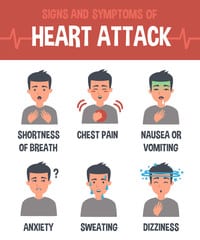When something is going wrong with the cardiovascular system it is very easy to be unaware of it. cardiac Symptoms that indicate heart disease can be so easy to miss because are so subtle and often vary from person to person, depending on their age, lifestyle and certain health risks.
Read on to discover which important cardiac symptoms you need to be aware of and which ones the London Cardiovascular Clinic think warrant investigation by a professional sooner rather than later.
Atrial Fibrillation
Atrial fibrillation isn’t only a worrying cardiac symptoms but also a form of the irregular heartbeat which commonly occurs with age. It is commonly signified by a fast, chaotic heart rate. If left untreated, it can lead to breathlessness, blackouts or even stroke, so it is imperative that you see a cardiologist to ascertain the cause of your atrial fibrillation and to decide what your treatment plan should be.
Blackouts or fainting is another cardiac symptoms
Many people have experience of fainting, which can often be attributed to factors such as extreme heat, dehydration or hunger, and these episodes are largely not serious. But if these become regular and there is no rational explanation, this could mean a narrowing of the heart valves or even a neurological problem of some kind. If the following applies to you:
- You already have heart disease, or
- You’ve had an abnormal ECG test reading, or
- You have a family history of blackouts, epilepsy or sudden death under the age of 40
You should book yourself in for urgent investigations with your cardiologist.
Breathlessness
There are several causes of general breathlessness including asthma, a lack of physical fitness, obesity and anaemia. It is also commonplace to become ‘out of breath’ when running or carrying out physical work, for example. However, when shortness of breath comes on unexpectedly or it gets worse over time, even when you are not particularly active, then this needs investigation.
Shortness of breath can be attributed to heart failure or congestive cardiac failure, where the heart is unable to pump blood around the body properly. Your cardiologist will perform a thorough examination to ascertain the cause of your breathlessness and this will include physical tests as well as questions about your lifestyle.
Chest Pain
Chest pain can have several causes, and these can include indigestion and muscular pain. But sometimes it can be an indicator of something more serious like angina, or hardening of the arteries. This is a common form of coronary heart disease and should be investigated thoroughly by a cardiologist.
Heart Palpitations
It is quite normal to occasionally hear your heartbeat, which can sound like blood rushing past your ear, but when you become aware of your heart beating in an irregular manner and especially if this is sometimes accompanied by fainting or light-headedness then this is the time to have these symptoms investigated. An irregular heartbeat can be classed as tachycardia or bradycardia – very fast or very slow heartbeat. Your heart rate can be affected by certain medications or excessive intake of caffeine, but only by having this investigated by a cardiologist can you find the correct cause of your irregular heartbeat.
High Blood Pressure
According to a recent study, around 5 million adults in the UK suffer from high blood pressure symptoms. Untreated hypertension is a leading cause of stroke, heart failure, heart attack and kidney failure. When we talk about blood pressure we’re talking about how much force is used when the heart pumps blood around the body and a ‘normal’ range for an adult is between 120/80 and 140/90. If your blood pressure is consistently at the top end of this range or above 140/85 you should seek medical advice.
We’ve covered only the most common cardiac symptoms which can affect the heart, but if in doubt about any aspect of your heart health, do not hesitate to visit a cardiologist.
Further information:
- Mesothelioma: Causes, Diagnosis, Symptoms, Risk, Prevention and Treatments
- All You Need to Know about How Blood Flows in Relation to Chest Compressions
- How to Notice Early Stages of Brain Tumor, Symptoms and Treatments
Thank you for reading this post. Don't forget to subscribe to our YouTube site here for Health and dental care content. Furthermore, follow us on Facebook, X.com (Twitter), Pinterest, Telegram, TikTok, LinkedIn, and WhatsApp Channel.




